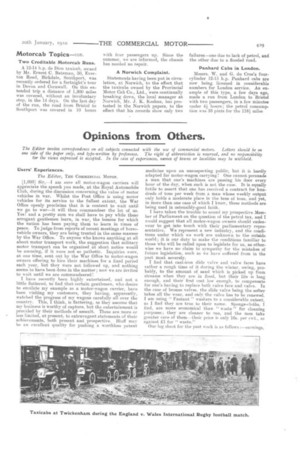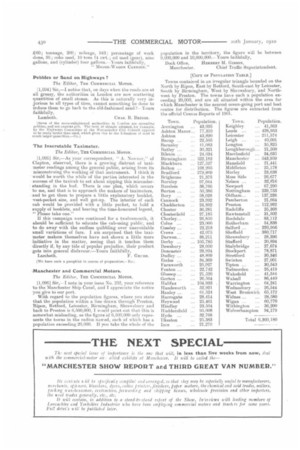Opinions from Others.
Page 17

Page 18

If you've noticed an error in this article please click here to report it so we can fix it.
The Editor invites correspondence on all subjects connected with the use of commercial motors. Letters should be on one side of the paper only, and type-written by preference. The right of abbreviation is reserved, and no responsibility for the views expressed is accepted. In the case of experiences, names of towns or localities may be withheld.
Users' Experiences.
The Editor, THE COMMERCIAL MOTOR.
1.1,093] Sir,—I am sure all motor-wagon carriers will appreciate the speech you made, at the Royal Automobile Club, (luring the discussion concerning the value of motor vehicles in war. Whilst the Post Office is using motor vehicles for its service to the fullest extent, the War Office openly proclaims that it is content to wait until we go to war—it will then commandeer the lot of us. Yes! and a pretty sum we shall have to pay while these arrogant gentlemen learn, in war, the lessons for which the nation has been paying them to learn in times of peace. To judge from reports of recent meetings of horsevehicle owners, they are being treated in the same manner by the War Office. To anyone who knows anything at all about motor transport work, the suggestion that military motor transport can be organized at short notice would be amusing, if it were not so pathetic. Inquiries were, at one time, sent out by the War Office to motor-wagon owners offering to hire their machines for a fixed period each year, but they were not followed up, and nothing seems to have been done in the matter ; now we are invited to wait until we are commandeered!
I have recently been highly entertained, and not a little flattered, to find that certain gentlemen, who desire to emulate my example as a motor-wagon carrier, have been visiting my customers, they having, apparently, watched the progress of my wagons carefully all over the country. This, I think, is flattering, as they assume that my business is worthy of capture, but the entertainment is provided by their methods of assault. These are more or less limited, at present, to extravagant statements of their achievements, both present and prospective. Bluff may be an excellent quality for pushing a worthless patent
medicine upon an unsuspecting public, but it is hardly adapted for motor-wagon carrying. One cannot persuade a man that one's machines are passing his door every hour of the day, when such is not the case. It is equally futile to assert that one has received a contract for hundreds of tons per week from a man whose weekly output only holds a moderate place in the tens of tons, and yet, in more than one case of which I know, these methods are being used in ostensibly-good faith. I have taken the trouble to sound my prospective Member of Parliament on the question of the petrol tax, and I would suggest that all motor-wagon owners should endeavour to get into touch with their parliamentary representative. We represent a new industry, and the conditions under which we work are unknown to the outside world; it is our duty to make the conditions familiar to those who will be caned upon to legislate for us, as otherwise we have no claim to sympathy for the mistakes of future legislation, such as we have suffered from in the past most severely.
I find that cast-iron slide valve and valve faces have lather a rough time of it during the winter, owing, probably, to the amount of sand which is picked up from streams when they are in flood, but their life is long enough, and their first cost low enough, to compensate for one's having to replace both valve face and valve. In the case of bronze valves, the slide valve being the softer takes all the wear, and only the valve has to be renewed. I am using " Pedant " washers to a considerable extent, as I find they are true to their name. Sponge-cloths. find, are more economical than " waste for cleaning purposes; they are cleaner to use, and the men take greater eare of them—their price is only 16s. per cwt., as against 4:1 for " waste."
Our log sheet for the past week is as follows :—earnings, £60; tonnage, 209; mileage, 943; percentage of work done, 95; coke used, 10 tons 14 cwt.; ail used (gear), nine gallons, and (cylinder) four gallons.-Yours faithfully, " MOIOK-WAGON CARRIER."
-Pebbles or Sand on Highways ?
The Editor, TRE COM ME R CI A L MOTOR.
1,094] Sir,-I notice that, on days when the roads are at all greasy, the authorities in London are now scattering quantities of small stones. A this is naturally very injurious to all types of tires, cannot something be done to induce them to go hack to the old-fashioned sand ?Yours faithfully, Lambeth. CHAS. B. 13151005.
[some of the more-enlightened authorities in T.ondon are spreading pebbles, and not angnlar grit. The fern of shingle adopted, for example, by the Righways Committee or the Westminster City Council appears to be really better than sand, which gives Ike to the furniation of mud in math larger quantities.-F.D.]
The Inscrutable Taximeter.
The Editor, THE COMMERCIAL MOTOR.
[1,095] Sir,--As your correspondent, " A. Nowner," of Clapt,on, observed, there is a growing distrust of taximeter readings among the general public, arising from its misconstruing the workiug of that instrument. I think it would be worth the while of the parties interested in the success of the taxicab to set about nipping this misunderstanding in the bud. There is one plan, which occurs to me, and that is to approach the makers of taximeters, and to get them to prepare a little explanatory booklet, 'vest-pocket size, and well got-up. The interior of each cab would be provided with a little pocket, to hold a supply of booklets, and bearing the time-honoured legend, "Please take one."
If this campaign were continued for a twelvemonth, it should be sufficient to educate the cab-using public, and to do away with the endless quibbling over unavoidable small variations of fare. I am surprised that the taximeter makers themselves have not shown a little more initiative in the matter, seeing that it tenches them 'directly if, by any tide of popular prejudice, their product .gets into general disfavour.-Yours faithfully, Lambeth. F. GRUBB. fWe have such pamphlet in course of preparation.ED.1
'Manchester and Commercial Motors.
The Editor, Tun Co:al/Recut MOTOR.
[1.096] Sir,-1 note in your issue No. 252, your reference to the Manchester Ship Canal, and I appreciate the notice you give to our port.
With regard to the population figures, where you state that the population within a line drawn through Preston, Retford, Leicester, Birmingham, Shrewsbury and back to Preston is 6,500,000, I would point out that this is somewhat misleading, as the figure of 6,500,000 only represents the towns in the radius named, earth of which has a population exceeding 20,000. If :!.,•ou take the whole of the population in the territory, the figure will be between 9,000,000 and 10,000,000.Yours faithfully, Dock Office, HERBERT M. Ginsorr, Manchester. Chief Traffic Superintendent.
[Com' Os POPULATION TABLE.] Towns contained in an irregular triangle bounded an the North by Ripon, East by Retford, South-east by Leicmter, South by Birmingham, West by Shrewsbury, and Northwest by Preston. The towns have each a population exyeeding 20,000, and are all situated within the area for which Manchester is the nearest ocean-going port and best centre for distribution. The figures are extracted from the official Census Reports of 1901.






















